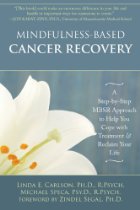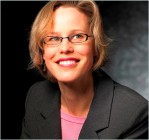 Psycho-oncology researchers and colleagues Linda Carlson and Michael Speca have been running mindfulness-based groups for cancer patients for over ten years now, and that experience has led to the development of a powerful program and now a very helpful new book from New Harbinger entitled Mindfulness-Based Cancer Recovery: A Step-by-step MBSR Approach to Help You Cope With Treatment and Reclaim Your Life. Read their individual accounts of the unfolding of this program below.
Psycho-oncology researchers and colleagues Linda Carlson and Michael Speca have been running mindfulness-based groups for cancer patients for over ten years now, and that experience has led to the development of a powerful program and now a very helpful new book from New Harbinger entitled Mindfulness-Based Cancer Recovery: A Step-by-step MBSR Approach to Help You Cope With Treatment and Reclaim Your Life. Read their individual accounts of the unfolding of this program below.
 Michael: In 1995, I had been working as a newly minted psychologist for a couple of years and found myself working in a busy cancer treatment centre in Calgary, Alberta. On one particular day, two colleagues and I were sitting together having lunch in the hospital cafeteria and talking about our work, which consisted primarily of counseling and providing support to cancer patients and their families.
Michael: In 1995, I had been working as a newly minted psychologist for a couple of years and found myself working in a busy cancer treatment centre in Calgary, Alberta. On one particular day, two colleagues and I were sitting together having lunch in the hospital cafeteria and talking about our work, which consisted primarily of counseling and providing support to cancer patients and their families.
While discussing with some awe and not a little reverence the immensity of challenges many patients encounter and often overcome, we also spoke of our gratitude for the opportunity to do the work that we did. Eventually we got around to acknowledging that this work was not without cost to us. Caring about the people with whom we work means sharing in their loss and grief as well as their triumphs. These experiences also heightened our own sense of vulnerability.
As our discussion deepened that day we discovered that we had something else in common. Each of us to varying degrees relied on meditation and yoga to cope with the stresses of our own lives. It occurred to us that some of our patients might benefit from these practices in a different way than what counseling could provide. We wondered if it would be possible for us to offer a program where we could share what we had learned through our own experience with meditation. How would it be accepted in the highly technical and institutional medical setting that was our workplace?
From that point on we set out to develop a program. We cobbled together bits and pieces of the yoga and meditation we had practiced and tied it into what we knew about stress and the mind-body perspective from our training as health professionals. From this we created a workbook for participants. There were about equal parts yoga, including yogic breathing practices, and a range of meditation techniques including mindfulness meditation. The first few times we ran the program we obtained written feedback from everyone at the end of what were then seven-week sessions and used that information to refine our approach. Word of mouth quickly spread and we had little difficulty filling our classes.
 Linda: I joined the team first as a psychology intern in 1997, then as a postdoctoral fellow in 1998. Along the way we became more pointedly aware of Jon Kabat-Zinn and his MBSR approach. We developed a profound respect for the sensitivity and thoroughness with which he had described his work in his book Full Catastrophe Living: Using the wisdom of your mind and body to face stress, pain and illness and began to recommend it to all of our patients.
Linda: I joined the team first as a psychology intern in 1997, then as a postdoctoral fellow in 1998. Along the way we became more pointedly aware of Jon Kabat-Zinn and his MBSR approach. We developed a profound respect for the sensitivity and thoroughness with which he had described his work in his book Full Catastrophe Living: Using the wisdom of your mind and body to face stress, pain and illness and began to recommend it to all of our patients.
At about that time we began to conceive of our first formal study comparing the changes over time between patients randomized to either our mindfulness program or a wait-list control condition. We were pleased to find that our impressions of the value of these methods and the reports of benefit from patients were supported by the outcomes of that study, which was published in Psychosomatic Medicine in 2000 and has been cited almost 300 times since then!
We continued to write grants, run programs, train students and publish the results, which brought us to the 2008 when I was beginning my first maternity leave. Based on our body of work, I was approached by the publisher New Harbinger and asked if I wanted to write a mindfulness book for cancer patients. I thought it was a good idea and would give us a chance to write down a lot of what we had refined into our program over the years. Of course I asked Michael to be my co-author, given that we had been running groups together for the previous 10 years and it was his wisdom to originally develop the program, and the result, almost three years later, is Mindfulness-Based Cancer Recovery!
We are really pleased to see it in print and hope that it may, in some small ways, help those facing this journey. We wrote it with not only people who were diagnosed with cancer themselves in mind, but also their support network of professionals, friends and family. It might also be of interest to health-care professionals interested in applying mindfulness to their own work with people who have cancer and other chronic illnesses.

